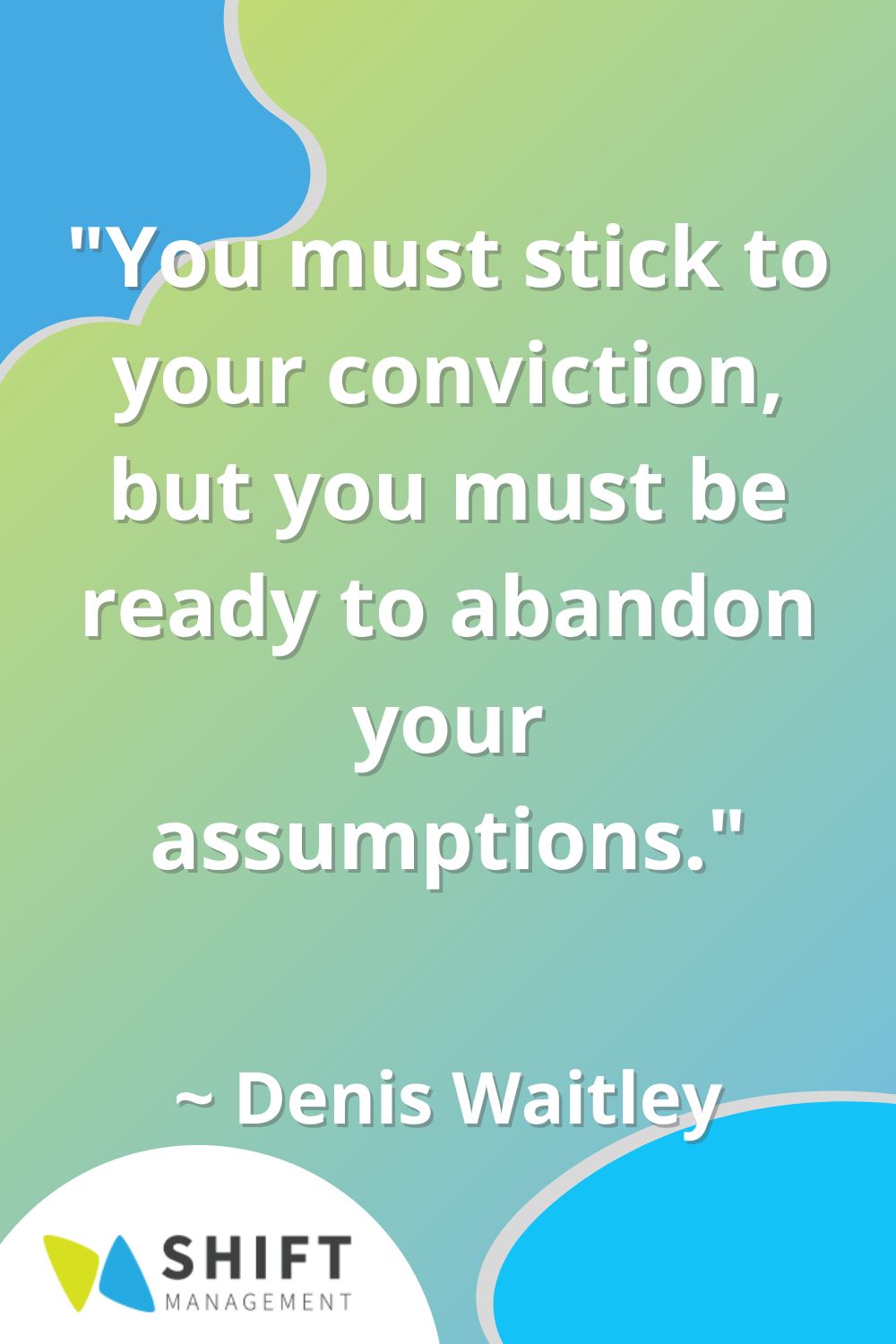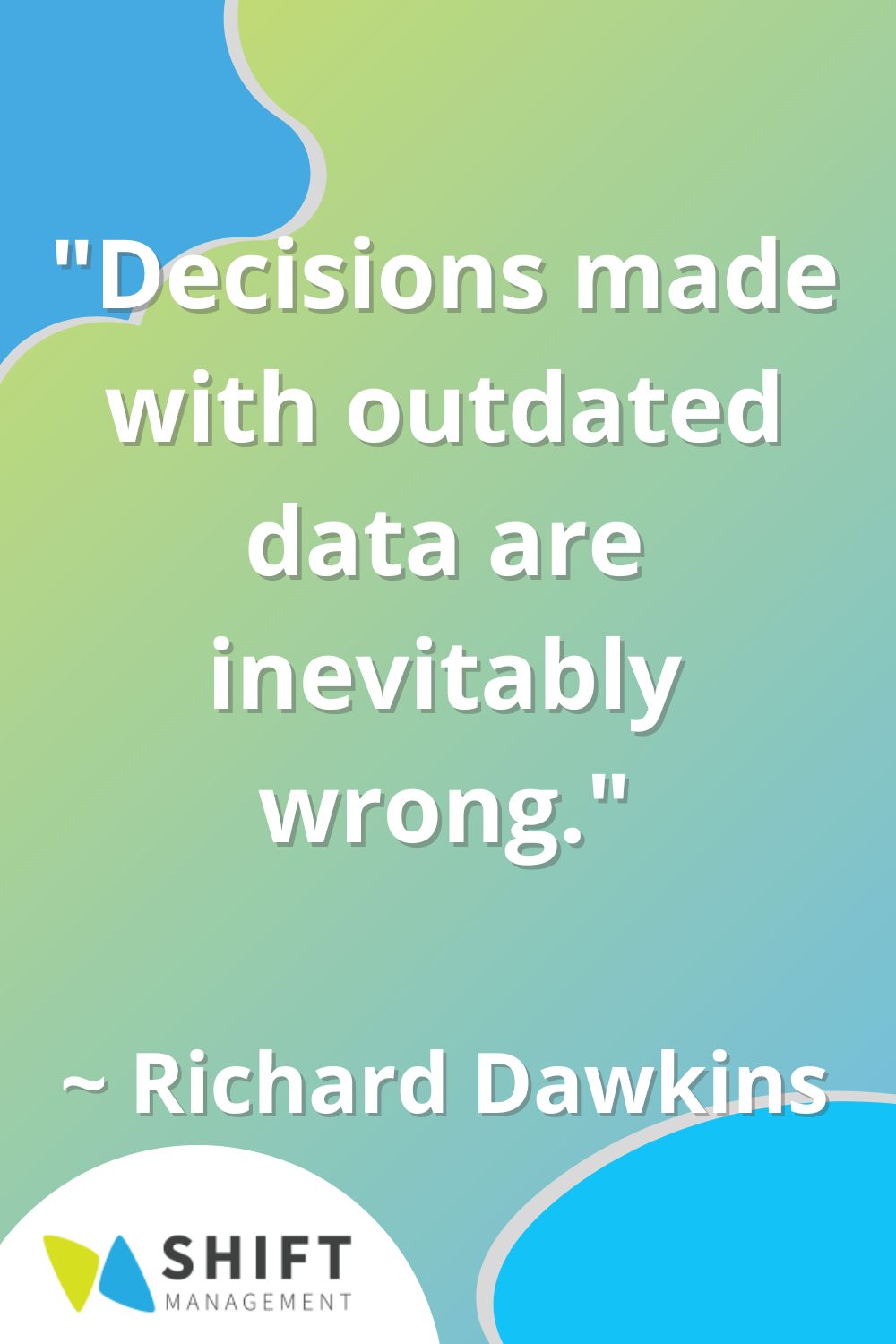Are your social assumptions about people’s motivations accurate?
Have you noticed yourself or others making any of these kinds of statements? Engaging in comm skills training can help you challenge these assumptions and improve your understanding of team dynamics.
- “Why do we need _________? I would never use it.”
- “Back in the day when we only had two TV channels…”
- “What barriers? I didn’t have any issues.”
- “It’s because people have no (insert virtue here).”
- “Research says…right?”
- “It was 20 years ago but I remember it like yesterday.”
- “Let’s just say I like to be the devil’s advocate.”
- “That department will never ________, don’t even bother _________.”
I’m going to let you in on an important truth. Mostly our information about how things work, why they are the way they are, and what people’s motivations are, is wrong. And yet we often don’t bother to question the accuracy of our perceptions OR the sometimes disastrous outcomes of making decisions based on faulty social assumptions about people.
Incorrect assumptions about people could be the reason we might make a bad hire, or choose a mate who is unsuited to us. Assumptions can damage our relationships with our children. It can also cause us to misunderstand the motives of clients, colleagues and business partners. In short, our social assumptions often color our lives more brightly that we may be aware of.
In Malcom Gladwell’s book “Blink” he describes how our snap judgments of others bias our capacity to actually hear what people are saying or to see them for who they are. In his writing, Gladwell looks at multiple experiments that present participants with word associations and images. He then time the decisions the participants make with respect to the visual input they are receiving.
For example the researcher asked participants to associate the words “good” and “bad” with photos of black and white people and then timed how long it took people to make a judgment. Researchers found that even people who are aware of their prejudice and who actively work to stop it have trouble aligning their snap decisions with their intellectual values consistently.
As I have paid attention to the kinds of comments people make in meetings and conversation, I have found the assumptions that underlie these dialogues stem from generalizations or misinformation. And none of us are immune to this. In fact, I have found that these assumptions about people can be grouped into 8 general categories – all harmful – that sneak into the way we think, speak, and behave.
What follows here presents these categories with the intent to increase our awareness of them so we can work to mitigate the hold they may have over our thinking. We will look at some strategies we can use to overcome these harmful social assumptions in the quest for more equitable outcomes, engaged teams and satisfying interpersonal relations.

The Dangerous 8 Social Assumptions
- Making decisions for the whole based on my personal preference – In other words letting what I like or don’t like become what everyone likes or doesn’t like. Example: “Why do we need a train to Calgary? I would never use it.”
- Insisting that some past experience I had is the current reality – Statements that sound something like, “Back in the day when we only had two TV channels…” convey the impression that what once was is much better than what now is.
- Thinking that my cultural or personal experience is the same as everyone else– It can be comforting for people to imagine that others think and behave as they do: it makes us feel as though we “fit in” and that we are “normal.” The trouble is that “normalcy” is a social construct and that this belief – that our experience is everyone’s experience – is entirely false. In fact this kind of thinking leads to an inability to consider alternatives, for example, “What barriers? I didn’t have any issues.”
- Concluding that the behaviour of others is directly attributed to their character flaws – Interestingly, we tend to attribute our own successes to our character strengths and our failures to circumstance, and we tend to believe others’ successes are due to circumstances and their failures are because of their innate character attributes. So, when we get great results, we think it’s because we are so well-organized. When others’ succeed, we tend to think it’s because the timing was right. When we fail, it’s because things just didn’t align how they should have, and for others, it’s because they didn’t have enough discipline, common sense, or forethought.
- Not verifying the source or accuracy of the data – Sometimes we defer to eternally unnamed experts rather than checking our facts. Think, “Research says…right?”
- Staying stuck in a past experience and continuing to bring it up without identifying what was learned or what the necessary next steps should be. You’ve seen this pattern before, maybe even in yourself: “It was 20 years ago but I’m still hurt.”
- Inability to identify our own resistance to learning and how it is affecting the progress of the group – While we might consider our rigidity a strength, being around naysayers who prefer to play the “devil’s advocate” and who constantly find faults and resist change can create a negative climate for everyone around them.
- Negative and discouraging comments about the capacity of the community that box people into the past and don’t allow them to contribute to the present. For example, “That department will never learn the software, don’t even bother talking to them.”
So how do we overcome these social assumptions that can be so detrimental to perceiving people, things and contexts the way they really are or with the potential they actually have?
Assume that you do need to get more information and that what you already have is likely to be faulty. Share on X
Few tips for challenging assumptions:
- Consider that 90% of what we perceive and assume is wrong (wait – did you check the source of this data?). “Assume” that you do need to get more information and that what you already have is likely to be faulty. This develops a learning attitude.
- Take note of things you say regularly or things you find regularly irritating. Ask yourself what the assumption is behind a statement you are making. Challenge yourself to uncover it’s source and stop it in its tracks.
- Reverse roles: Put yourself into your assumption and see how it feels – if you don’t like it, neither will others.
- Get in the habit of collecting facts from as many diverse sources as you can. If diverse sources agree, you may be on the right track.
- Double check your sources and your data, ask questions, think before speaking – what will be the long-term effects of this attitude, this comment, this judgment?
- Communicate with others when something bothers you, but in an open-ended way that allows the other person to provide input. Use questions that open up possibility. Keep the intent positive and give others the benefit of the doubt. For example, you could start a difficult conversation with, “There is something I’m concerned about. I probably misunderstood the situation, so could you clarify this for me?” instead of, “You ALWAYS do________, what’s your problem?”
- Post the 8 faulty assumptions list somewhere you will remember to look at it.
- Look for people you admire for something they have overcome and learn from their experience. Frequently this is a humbling experience.
- Practice humility. It seems the right thing to do given the percentage of time we make faulty assumptions about people, events and things.
- Memorize this quote and bring it to mind when you are “convinced” you are right about something:

More good reads on the subject:
Distinguishing Between Inferences and Assumptions
http://www.criticalthinking.org/pages/distinguishing-between-inferences-and-assumptions/484
Hidden Assumptions: How they Trap Us and How to Escape
https://www.psychologytoday.com/blog/seeing-what-others-dont/201310/hidden-assumptions-0
Fact and Assumptions: What is the Difference and Why Does it Matter?
https://www.psychologytoday.com/blog/your-career-in-counseling/201110/facts-and-assumptions-what-is-the-difference-and-does-it
The Psychology of World Views: https://www.academia.edu/3089027/The_Psychology_of_Worldviews
Why Assumptions are Bad for Business: http://www.businessknowhow.com/growth/assumptions.htm
About Marie:
Marie Gervais, PhD., CEO of Shift Management Inc., provides managerial training and workforce interpersonal development to business and industry through online courses and web coaching. She helps individuals and organizations build talent and skills for leadership, communication, and conflict resolution particularly at the supervisory and middle management level. Her work has gained a reputation for excellence in integration and inclusion of the diverse workforce. With her team at Shift Management, Dr Gervais helps clients reach their business goals through team building coaching and industry-specific training development for interpersonal leadership skills. Her impactful digital and multi-media resources have been successfully implemented with many different populations and contexts. The results prove that a learning workplace is a happy and profitable one!
Check out Marie’s podcast Culture and Leadership Connections on Apple Podcasts and on the Shift website to hear stories of leadership and all things cultural. Consider the signature Supervisory Leadership Certificate Course for upskilling your workforce at:
https://shiftworkplace.com/courses/supervisory-leadership/
Contact information:
780 993 1062









